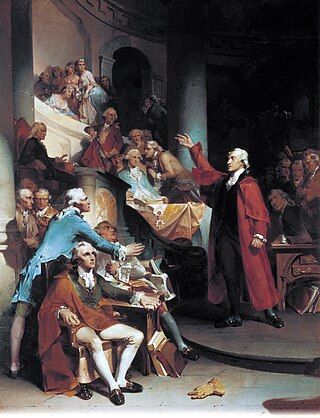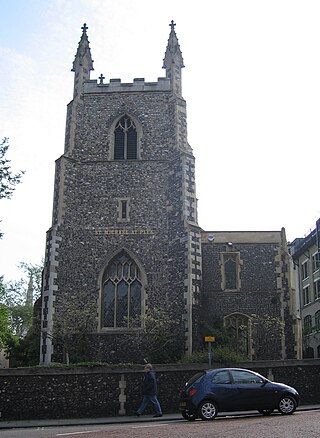Related Research Articles

The House of Burgesses was the elected representative element of the Virginia General Assembly, the legislative body of the Colony of Virginia.

The Virginia Company was an English trading company chartered by King James I on 10 April 1606 with the objective of colonizing the eastern coast of America. The coast was named Virginia, after Elizabeth I, and it stretched from present-day Maine to the Carolinas. The company's shareholders were Londoners, and it was distinguished from the Plymouth Company, which was chartered at the same time and composed largely of gentlemen from Plymouth, England.
Sir George Yeardley was a planter and colonial governor of the colony of Virginia. He was also among the first slaveowners in Colonial America. A survivor of the Virginia Company of London's ill-fated 1609 Third Supply Mission, whose flagship, the Sea Venture, was shipwrecked on Bermuda for ten months, he is best remembered for presiding over the initial session of the first representative legislative body in Virginia in 1619. With representatives from throughout the settled portion of the colony, the group became known as the House of Burgesses. Burgesses have met continuously since, and is known in modern times as the Virginia General Assembly.

Middle Plantation in the Virginia Colony was the unincorporated town established in 1632 that became Williamsburg in 1699. It was located on high ground about halfway across the Virginia Peninsula between the James River and York River. Middle Plantation represented the first major inland settlement for the colony. It was established by an Act of Assembly to provide a link between Jamestown and Chiskiack, a settlement located across the Peninsula on the York River.

The Virginia House of Delegates is one of the two houses of the Virginia General Assembly, the other being the Senate of Virginia. It has 100 members elected for terms of two years; unlike most states, these elections take place during odd-numbered years. The House is presided over by the Speaker of the House, who is elected from among the House membership by the Delegates. The Speaker is usually a member of the majority party and, as Speaker, becomes the most powerful member of the House. The House shares legislative power with the Senate, the upper house of the General Assembly. The House of Delegates is the modern-day successor to the colonial House of Burgesses, which first met at Jamestown in 1619. The House is divided into Democratic and Republican caucuses. In addition to the Speaker, there is a majority leader, majority whip, majority caucus chair, minority leader, minority whip, minority caucus chair, and the chairs of the several committees of the House.

The Capitol at Williamsburg, Virginia housed both Houses of the Virginia General Assembly, the Council of State and the House of Burgesses of the Colony of Virginia from 1705, when the capital was relocated there from Jamestown, until 1780, when the capital was relocated to Richmond. Two capitol buildings served the colony on the same site: the first from 1705 until its destruction by fire in 1747; the second from 1753 to 1780.
Francis West was a Deputy Governor of the Colony and Dominion of Virginia.

Philip Cottington Ludwell was an English-born planter and politician in colonial Virginia who sat on the Virginia Governor's Council, the first of three generations of men with the same name to do so, and briefly served as speaker of the House of Burgesses. In addition to operating plantations in Virginia using enslaved labor, Ludwell also served as the first governor of the Carolinas, during the colony's transition from proprietary rule to royal colony.
Thomas Graves was one of the original Adventurers (stockholders) of the Virginia Company of London, and one of the very early Planters (settlers) who founded Jamestown, Virginia, the first permanent English settlement in North America. He was also the first known person named Graves in North America. Captain Thomas Graves is listed as one of the original Adventurers as "Thomas Grave" on page 364, Records of the Virginia Company of London, vol. IV.

William Moss Capps, Sr. was born in Norfolk, England in or around 1575. William married Catherine Jernagin in Norwich, Norfolk, England, 11-Dec-1596, at St. Michael at Plea. He and his wife had five children together: Henry, Frances, Willoughby, Anne, and William.
Colonel Edward Hill was a Virginia planter, soldier and politician. In addition to representing Charles City County for many terms in the House of Burgesses, fellow members three times selected him as its Speaker, and he sat in the Virginia General Assembly's upper house, the Virginia Governor's Council in 1651 as well as from 1660 to 1663. Burgesses also sent Hill to Maryland to put down Richard Ingle's 1646 rebellion, and he acted as the colony's temporary governor before ceding to the proper governor, Leonard Calvert, but later contested nonpayment of monies promised to him and Virginia militia troops for that action. Col. Hill also led the Charles County and Henrico County militia and Pamunkey Native Americans against other tribes in Hanover County in 1656, with less success.
Captain Thomas Harwood emigrated from Britain and became a soldier, landowner and politician in the Colony of Virginia. He founded a family which like him for generations often represented the area now known as Newport News, but which in his day was known as Mulberry Island, and later Warwick River and still later Warwick County. Despite coming into conflict with royal governor Sir John Harvey in 1635, and a gap in legislative service, Harwood became the 5th speaker of the House of Burgesses.
William Powell, was an early Virginia colonist, landowner, militia officer and legislator. Considered an ancient planter for living in the Virginia colony during its first decade, he was one of two representatives from what became James City County, Virginia in the first Virginia House of Burgesses in 1619. His former plantation, now across the James River in Surry County, Virginia is now within Chippokes State Park.

The Governor's Council, also known as the Privy Council and Council of State, was the upper house of the legislature of the Colony of Virginia. It also served as an advisory body to the royal governor and as the highest judicial body in the colony. Beginning in the 1630s, its 12 members were appointed by the British sovereign. After Virginia declared its independence from Great Britain in 1776, members were appointed by the General Assembly, and most of their powers were redistributed to the newly formed Senate of Virginia and the state's judiciary. The Council was formally abolished after delegates to the 1850 Virginia constitutional convention voted to enact what became known as the "Reform Constitution," which vested many of its remaining functions in the popularly elected offices of Governor, Lieutenant Governor, and Attorney General.
Rice Hooe was the name of three Virginia colonists, two of whom served in the colonial House of Burgesses, and became ancestors of a family of planters important in northern Virginia and southern Maryland. Their descendants Alexander Hooe, Bernard Hooe Jr., James Hooe, two named John Hooe as well as John Hooe Jr., and William Hooe would all serve in the Virginia General Assembly before the American Civil War.
Samuel Sharpe, sometimes referred to as Samuel Sharp was an early Virginia colonist who settled in the area that became Charles City County, Virginia. He came to Virginia in 1610 with most of the passengers and crew of the Sea Venture as they made their way to the colony after 10 months in Bermuda. They had wrecked in a storm there and built two small boats to complete their journey to Jamestown. Along with Samuel Jordan, he represented Charles City as a burgess in the first general assembly of the Virginia House of Burgesses in Jamestown, Virginia in 1619. He was a representative for Westover, an incorporation of Charles City, in the 1623/24 assembly and signed a letter along with several burgesses at the time of that assembly.
William Spence was an early Virginia colonist on Jamestown Island. He was member of the first assembly of the Virginia House of Burgesses in Jamestown, Virginia in 1619. Spence became an ensign in the local militia and is thus sometimes identified as Ensign William Spence or Ensign Spence. He was an early farmer on Jamestown Island, a tobacco taster and landowner at Archer's Hope. He, his wife and his young daughter, Sara, or Sarah, avoided the Indian massacre of 1622, but Spence and his wife were reported "lost" at the census of February 16, 1624.
William Sharpe was an early Virginia colonist, soldier, ancient planter, and Virginia Company shareholder who settled in the Bermuda Hundred area that became part of Charles City County, Virginia. He served in the Virginia House of Burgesses in Jamestown, Virginia, in 1629.
John Pollington was an early Virginia colonist who was a member of the first assembly of the Virginia House of Burgesses at Jamestown, Virginia in 1619 for the "Citie" of Henricus, Virginia. In 1624, he was a burgess for Warrosquyoake Shire sometimes shown as Warresqueak and other variations, now Isle of Wight County, Virginia. He also was a landowner and merchant.
Robert Stacy was a colonist and politician in the Colony of Virginia who briefly served as one of the 22 members of the first assembly of the Virginia House of Burgesses in 1619.